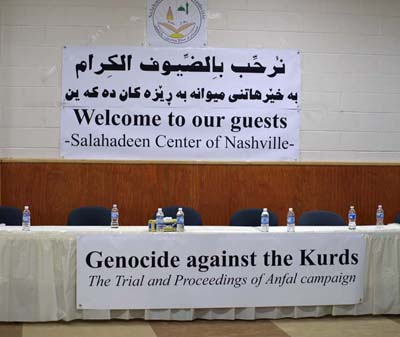
By Will Pedigo
On January 31st 2008, Vanderbilt University hosted a panel discussion led by trial judges from the Iraqi High Tribunal. It was a big deal for Nashville. The Iraqi High Tribunal was created by the Iraqi Governing Council in 2003 to provide justice for the atrocities committed by Saddam Hussein’s regime. It represents one of the few times in history, like the Nuremberg Trials after WWII, that charges of genocide have been brought before a court of law.
While Vanderbilt University Law professor Michael Newton served as a key international advisor to the Iraqi High Tribunal, this event connected in an even more intimate way for Nashvillians. Much of the audience present that night represented Nashville’s Kurdish community, the largest in the US. They were familiar with the history and relevance of the tribunal and when allowed, immediately raised several astute questions for the judges. What would have been simply a highly educative opportunity to hear from international trial judges visiting a prestigious American law school became a gripping debate about the future for justice in Iraq.
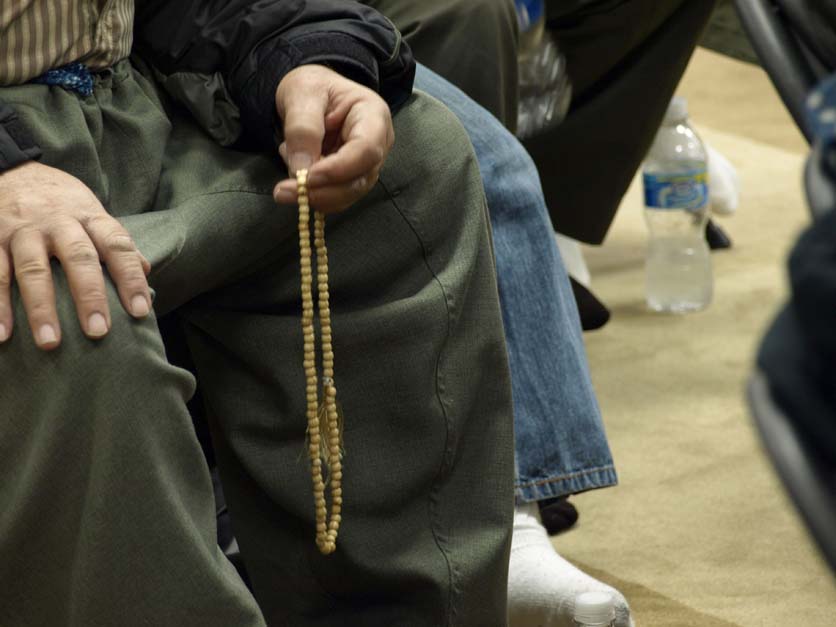
Contrary to public knowledge, the Vanderbilt event featuring the Iraqi High Tribunal was not its only speaking engagement in Nashville. Friday night, February 1, the tribunal convened again at Nashville’s Salahadeen Center, the first Kurdish Mosque in North America, to meet with Nashville’s Kurdish Community. Fortunately, NPT was invited to observe.
NPT is currently at work on our new Next Door Neighbors documentary series, which will explore Nashville’s emergence as a mid-sized-American international city. The first installment of Next Door Neighbors will look at the Kurdish community in Nashville. Now thirty-years strong, the community is remarkable, and an example of what has been termed the United State’s Global Interior — across the US, cities like Nashville have become prominent destinations for refugee resettlement and new immigration. In 2007, we produced the documentary Nashville: City of Refuge, which centered on one Somali family’s resettlement here.
It is through our research into the Kurdish community that we were invited to attend the meeting between Nashville’s Kurds and the Iraqi High Tribunal at Salahadeen Center. Unlike the Vanderbilt event, the Tribunal spent less time presenting information, and more time fielding questions from a packed house of Kurdish immigrants and Kurdish-Americans.
One question was repeated and redirected over and over again by those in attendance: Why was Saddam Hussein executed on December 30, 2006?
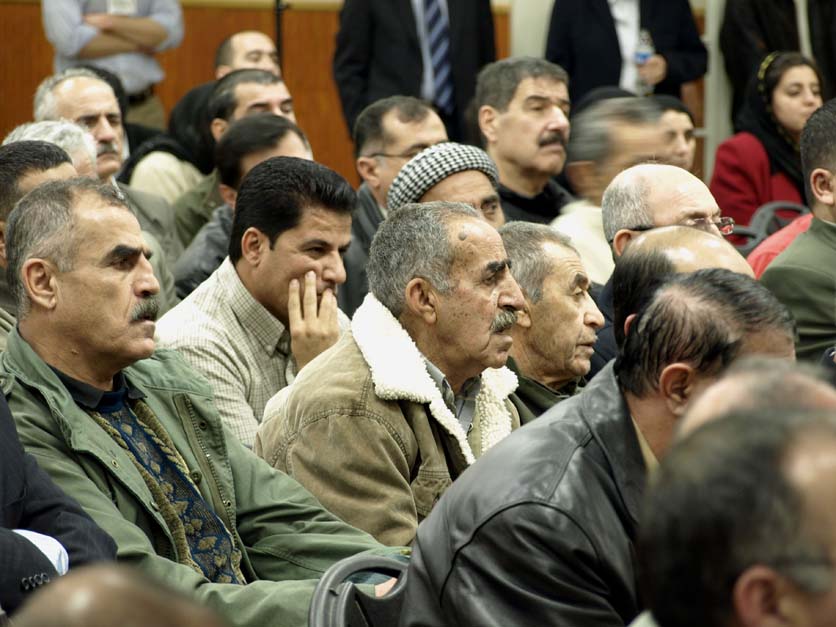
The answer, if there is one, says a lot about being Kurdish, the unstable future for justice in Iraq, and the complexity of Iraqi politics.
Saddam Hussein was executed on December 30, 2006 after being found guilty of the deaths of 148 people in a predominantly Shia town, only one of many charges against the former dictator.
Once he was executed, subsequent charges against Saddam Hussein were dropped. For the Kurds, this meant Saddam Hussein would never be personally indicted for his “Al Anfal” campaign, which resulted in the deaths of an estimated 180,000 Kurds.
The frustration of Kurds regarding Saddam’s expedited death made headlines in the PBS program NewsHour.
That frustration was recently rekindled by the Iraqi High Tribunal’s trial of Ali Hassan al-Majid, nicknamed “Chemical Ali,” who implemented Saddam’s genocide against the Kurds in northern Iraq. “Chemical Ali” gained his infamous title through the use of chemical weapons against Kurds.
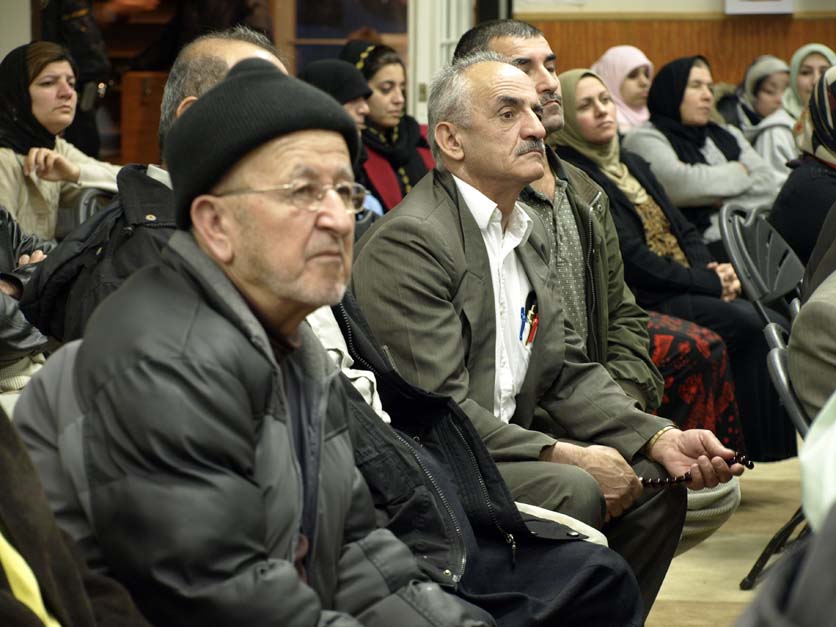
While Saddam was executed within 30 days of his sentence, as dictated by Iraqi law, Chemical Ali’s execution has been postponed.
The Kurdish community in Nashville gathered to hear the Iraqi High Tribunal respond to their demands for justice regarding the genocide of their families and friends. The Iraqi High Tribunal had no definitive answers to offer.
Kurds came to Nashville as refugees, fleeing genocide and oppression. Like many refugees, they sacrificed their former lives for new ones. They left their homes, their neighbors and their culture in search of security and survival. Kurds still carry the wounds of victimization. They also carry their homeland in their hearts, with memories of Kurdistan and their many years of struggle ever present in their lives.
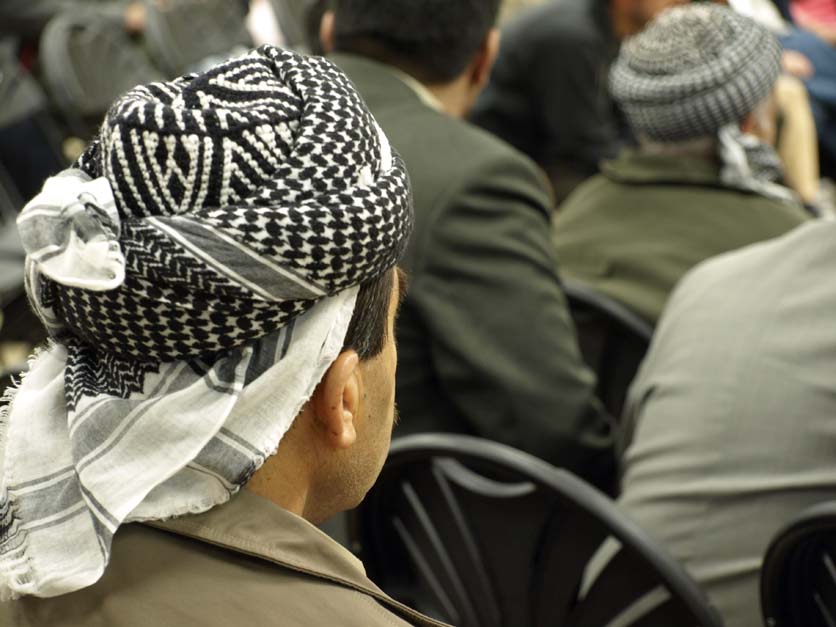
Here in Nashville, Kurds have established a vibrant community that is known throughout North America for its strong Kurdish identity and culture.
Watching the evening unfold at the Salahadeen Center, I felt proud that Kurds have found a home in Nashville. The event reminded me that we as a city are becoming more deeply connected to global issues and events.
Our new neighbors have seen and experienced things we cannot imagine. Through their eyes we can benefit from a broader awareness of our city’s relationship to the world, and together, as neighbors, appreciate what it means to be a part of the new American frontier.
7 Comments
Fascinating Article!
Your wonderful work is greatly appreciated.
Thank you!
A fascinating article with great detail and description of both of the Thursday 01/31/08 and Friday 02/01/08 Panel discussion on the Kurdish Genocide which is labeled as the Anfal campaign against the innocent civilian of the Kurdish in the Iraqi Kurdistan between 1986 and 1988 where 182,000 innocent Kurdish personals had disappeared in result in addition to destroying more than 46,000 villages. Will Pedigo is one of the rare and clever media personals who is eager to explore, ask, and learn more in detail about the issues and events that he covers. He is a great reporter and producer who works patiently and passionately about the topics he write or cover about in which he will deeply connect with the audience and in result a great product will be produced as the above article. As a Kurdish individual who is actively involved and present and in the Nashville Kurdish community, I really appreciate and thank Mr. Pedigo for his contribution and support of the Kurdish community in Nashville. Thanks for NPT for having such altruistic staffer whom contribution to the station will last and benefit for decades and generation to come. Thanks
Hello, Will. Your mom forwarded this fascinating article to us. I very much enjoyed reading it and absorbing the info in it. We are so proud of you back here in Clarksville. Cindy Smith
HALABJA SPRING1988 )
Halabja is the old tale of unfrgettable of human history .
Halabja, the everlasting tale which has been recorded in the book of ((human wonders)).
Halabja is the territory of the Kurd, whom as far back as they can remember has been the victims of the most prejudice and violent actions of the unjust Iraqi regime due to their kurdish beliefs.
Halabja is located in a vast area that both greenery and beauty as well as faith and resistance have grown and blossomed in it.
Halabja is the old tale of the knife in the back.
Halabja is the battleground of a regime, armed with complex warfare technology against the unarmed people of its own country; the battle of mustard gas with the lungs of the infant children; the battle of cyanide with the throbbing hearts of the unarmed men and women; the battle of fighter bombers with mothers who have hidden in their bosoms their beloved children, or men who have turned their bodies into barricades for their wives.
Halabja the innocent land whose cries of innocence were muffled in its own geographic boundaries and where the resistance of its own people was choked with black chemical clouds.
The Kurds wanted Saddam Hussein to pay for this but they feel his Shia enemies hanged him for the first crime they could – and before any other charges were heard. And that’s Iraq all over.
So much pain and suffering at the hands of the Ba’ath Party and its obscene leader Saddam Hussein, so many tortured and murdered and yet it seems there’s no time or opportunity to revisit the crimes.
It’s as if the traumas of the present already outweigh those of the past.
Baghdad is in crisis. The militia and insurgents are killing each other and each others families on a daily basis.
Political factions are lining up to secure control of oil fields that lie almost idle while the fighting intensifies.
Kurdish warlords meet privately with Shia politicians to notionally divide up spoils they don’t yet possess.
The infrastructure is paralysed, and essential utilities are in short supply almost everywhere.
What time can there be for a remote Kurdish town that was hideously bombed by the real weapons of mass destruction?
Halabja (Kurdish: Helepçe or ههڵهبجه, Arabic: حلبجة ḥalabǧah) is a Kurdish town in Iraq or Southern Kurdistan about 150 miles northeast of Baghdad and 8-10 miles from the Iranian border. The town’s population is largely Kurdish.
The town lies at the base of what is often refereed to as the greater Hewraman region stretching across the Iran-Iraq border. Kurds in the city of Halabja generally speak Hewrami or Sorani, two different dialects of the Kurdish language.
Halabja poison gas attack
Halabja was occupied by Kurdish peshmerga supported by Iran in the final phase of the Iran-Iraq war. On 16 March 1988, after two days of conventional artillery attacks, Iraqi planes dropped gas canisters on the town.[1]
The town and surrounding district were attacked with bombs, artillery fire, and chemical weapons, the latter of which proved most devastating. At least 5,000 people died as an immediate result of the chemical attack and it is estimated that a further 7,000 people were injured or suffered long term illness.[2]
The attack is believed to have included the nerve agents Tabun, Sarin, and VX, as well as mustard gas. It is occasionally suggested that cyanide was also included among these chemical weapons, though this assertion has been cast into doubt, as cyanide is a natural byproduct of impure Tabun.[3][4][5] The attack on Halabja took place amidst the infamous Anfal campaign, in which Saddam Hussein violently suppressed Kurdish revolts during the Iran-Iraq war. Saddam Hussein ordered the use of chemical weapons in attacking up to 24 villages in Kurdish areas in April 1987.
Before the war ended the Iraqis moved in on the ground and completely destroyed the town.[6]
[…] Why Nashville? The answers vary, but here are a few: a similar climate to their native land, affordable housing and consistent job growth and, more recently, because the Nashville Kurdish community is known as one of the most vibrant in the U.S. […]